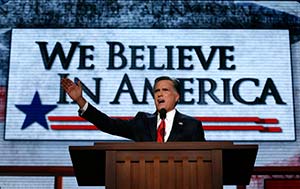WASHINGTON — In a nomination acceptance speech that focused largely on defining himself and criticizing the incumbent, Republican presidential nominee Mitt Romney Aug. 30 made little more than passing reference to a handful of the themes in the U.S. bishops’ quadrennial document offering Catholics a framework for election decisions. Mitt Romney accepts his party’s nomination during the final session of the Republican National Convention in Tampa, Fla., Aug. 30. Republicans nominated Romney, a Mormon and former governor of Massachusetts, as their candidate for president. (CNS photo/Adrees Latif, Reuters)
Mitt Romney accepts his party’s nomination during the final session of the Republican National Convention in Tampa, Fla., Aug. 30. Republicans nominated Romney, a Mormon and former governor of Massachusetts, as their candidate for president. (CNS photo/Adrees Latif, Reuters)
Speaking on the closing day of the Republican National Convention in Tampa, Fla., Romney, the former Massachusetts governor, spent about three-quarters of his address talking about his background and describing personal and political disappointments the American public may have experienced.
Romney made a few specific promises:
- To create 12 million new jobs by “taking full advantage of our oil and coal and gas and nuclear and renewables;” by giving “our fellow citizens the skills they need for the jobs of today and the careers of tomorrow;” by forging new international trade agreements; by assuring “every entrepreneur and every job creator that their investments in America will not vanish;” by championing small business; and by controlling the cost of health care by “repealing and replacing” the law he calls Obamacare.
- “I will not raise taxes on the middle class.”
- “I will protect the sanctity of life. I will honor the institution of marriage. And I will guarantee America’s first liberty: the freedom of religion.”
He did not elaborate on how he would accomplish those objectives.
The bishops’ “Forming Consciences for Faithful Citizenship” document is a 45-page discussion of Catholic teaching, how people can be involved in public policy, how church teaching relates to a range of contemporary policy issues and what positions the U.S. Conference of Catholic Bishops takes on those issues. It is available on the USCCB website at www.usccb.org.
It clusters issues under four themes: human life; family life; social justice and global solidarity. Each section includes multiple subthemes.
For example, the human life section touches on abortion, euthanasia, adoption, care for the sick and dying, the death penalty, avoiding war and promoting peace, and the use of military intervention only as a last resort.
The family life portion includes church teaching on marriage as between one man and one woman and church positions on educational rights, access to the Internet and parental choice of schools.
The social justice theme addresses issues ranging from just wages, care for the earth and the right to join a union to reduction of poverty, preservation of the social safety net, affordable housing, affordable and accessible health care for all and arguments for comprehensive immigration reform and protection for refugees.
The global solidarity section discusses global poverty and religious liberty, urges support for “beneficial” U.N. programs and says the U.S. should be active in seeking peaceful resolutions to regional conflicts and a just settlement of the Israeli-Palestinian conflict.
Romney’s speech mentioned a few of those issues, but there was little that fleshed out his positions.
Romney’s single sentences on the sanctity of life and the institution of marriage were his only references to those topics. He mentioned religious freedom just one other time, in a list of the ideals sought by immigrants to the United States.
He discussed the dreams of immigrants at some length, mentioned that his father was born in Mexico and devoted several passing references to a few international subjects, without elaborating on what he would do differently than Obama.
For example: “President Obama has thrown allies like Israel under the bus, even as he has relaxed sanctions on Castro’s Cuba. He abandoned our friends in Poland by walking away from our missile defense commitments, but is eager to give Russia’s President Putin the flexibility he desires, after the election. Under my administration, our friends will see more loyalty, and Mr. Putin will see a little less flexibility and more backbone.”
